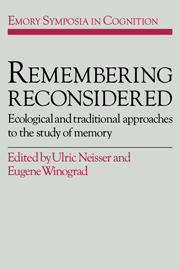Book contents
- Frontmatter
- Contents
- Preface
- List of contributors
- 1 New vistas in the study of memory
- 2 Continuities between ecological and laboratory approaches to memory
- 3 Memory for randomly sampled autobiographical events
- 4 Ordinary everyday memories: Some of the things of which selves are made
- 5 Walking in our own footsteps: Autobiographical memory and reconstruction
- 6 Memory observed and memory unobserved
- 7 The maintenance of marginal knowledge
- 8 The content and organization of autobiographical memories
- 9 The ontogeny of memory for real events
- 10 The functions of event memory: Some comments on Nelson and Barsalou
- 11 “The Wreck of the Old 97”: A real event remembered in song
- 12 Passive remembering
- 13 Remembering without experiencing: Memory for reported events
- 14 What is ordinary memory the memory of?
- 15 Go for the skill
- Name index
- Subject index
1 - New vistas in the study of memory
Published online by Cambridge University Press: 25 March 2010
- Frontmatter
- Contents
- Preface
- List of contributors
- 1 New vistas in the study of memory
- 2 Continuities between ecological and laboratory approaches to memory
- 3 Memory for randomly sampled autobiographical events
- 4 Ordinary everyday memories: Some of the things of which selves are made
- 5 Walking in our own footsteps: Autobiographical memory and reconstruction
- 6 Memory observed and memory unobserved
- 7 The maintenance of marginal knowledge
- 8 The content and organization of autobiographical memories
- 9 The ontogeny of memory for real events
- 10 The functions of event memory: Some comments on Nelson and Barsalou
- 11 “The Wreck of the Old 97”: A real event remembered in song
- 12 Passive remembering
- 13 Remembering without experiencing: Memory for reported events
- 14 What is ordinary memory the memory of?
- 15 Go for the skill
- Name index
- Subject index
Summary
This book presents important new findings and new ideas about remembering: what people remember, why they remember it, and how we might best describe the processes involved. These issues have been considered before, most notably by Sir Frederick Bartlett in the 1932 book from which our title is derived. Arguing that standard laboratory methods did not do justice to what he called the subject's “effort after meaning,” Bartlett introduced both new procedures (recall of meaningful stories) and new theoretical concepts (e.g., “schema”) into the study of memory. Although the influence of his work was slow to develop at first, its importance is now widely acknowledged: Story recall has become a standard laboratory technique, and “schema” a standard theoretical idea. No longer revolutionary, Bartlett's insights have been effectively assimilated into the traditional psychology of memory.
In the mid-1970s I undertook a general critique of contemporary mental-model-oriented cognitive psychology, including the study of memory (see Cognition and Reality [Neisser, 1976]). In the hope of stimulating a serious reconsideration of the prevailing assumptions in memory research, I presented a paper sharply critical of traditional approaches at the Cardiff conference on “Practical Aspects of Memory” in 1978. After nearly a century of research, psychologists still knew almost nothing about recall of early childhood experiences, about memorizing songs and poems, about memory for places, faces, and names, about the fate of knowledge acquired in school, about oral history, about testimony, about prospective remembering, or even about individual differences.
- Type
- Chapter
- Information
- Remembering ReconsideredEcological and Traditional Approaches to the Study of Memory, pp. 1 - 10Publisher: Cambridge University PressPrint publication year: 1988
- 6
- Cited by

